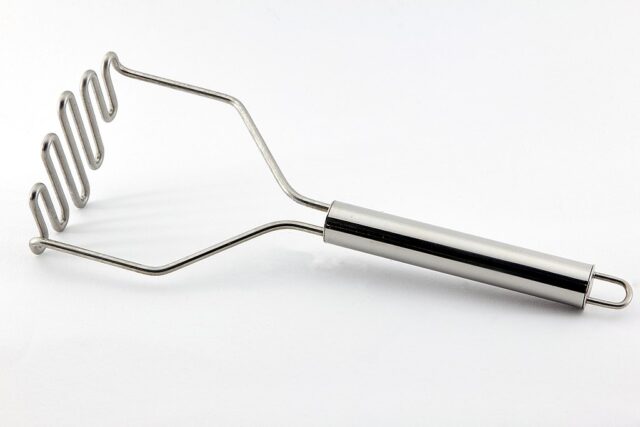Why I make really good mashed potatoes

When I eat at restaurants, I can’t tell you how many otherwise very good dishes are ruined because they are improperly seasoned: they either remain bland from lack of salt, or they are crushingly over-salted.
I make really good mashed potatoes because I was taught proper technique and how to season. However, the test of seasoning for me was difficult, as it is for all rookie cooks, and something that must be mastered. It takes time and experience, trial and error, to begin to understand what appears to be, on the surface, a really simple task.
At the restaurant where I worked, albeit quite a while ago, the mashed potatoes were much more than “mashed potatoes” by virtue of their supreme richness: and they were the foundation of my regular testing by the other cooks. The venue, 20 King, had something of a reputation for these potatoes (and certainly well before me). It was a legacy I had to carry on.
These super-rich spuds were a version of late super-chef Joel Robuchon’s monumentally delicious and iconic pommes purée. Not, of course, that I have travelled to L’Atelier de Joël Robuchon in New York, London or Paris, or to any of the many restaurants he once oversaw across the planet – and the stock pot-full of Michelin stars his cooking accumulated at them.
No, it was pretty clear across any number of cooks that I have talked to that Robuchon’s potatoes were what one strove for. I have tasted local versions of them many times — some excellent; others underseasoned.
These potatoes are the pinnacle, the ne plus ultra and the epiphanic first among equals when it came to the humble tuber, a swollen root, with a good amount of energy and vitamin C that has kept, and continues to keep, people alive as a basic foodstuff.
Robuchon’s rule, and now mine, for using only three or four ingredients in their preparation transformed the potato into creamy, silky goodness – a mouthful of lustrousness.
If you think of the French origins of fine dining, it seems at odds that something of such peasant quality – in Italy, la cucina povera – would grace a plate at a three-star venue. When I was a rookie cook, I promptly set about to read up on the Poiteiers, France-born Robuchon who, decades ago, sought to dismantle some of the stuffiness of French restaurants — and those dozens of Michelin stars were his reward.
I laugh when I write that that was my goal with my potatoes, but I had really had to get past the flaws in my ability to season correctly.
The ingredients were absolutely, and almost humorously, basic: potatoes (Robuchon apparently preferred a French cultivar with a rather unsavoury name for use in a kitchen, at least in the connotations of the English language, “La Ratte”), whole milk, a shitload of butter – and salt.
As with any dish, I came to understand that the whole endeavour was broken out into two components: ingredients and techniques, like the binary aspect, “ingredients and method,” of a basic recipe.
While the best ingredients, obviously, is what cooks and restaurants strive for, there is no way you can forget proper techniques which, I came to understand, are really the only action we can take to come between a successful dish and disaster. It’s what the other cooks were hoping to teach me.
I did my best.
To make Robuchon’s pommes purée, or our version thereof at the restaurant, you start by making sure your oven is at 350F. That is very important. Before the potatoes, before the butter and before the salt, that is the critical and the simplest first step when it comes to all-important mashed potato technique.
Simple, eh?
The process, as I came to think of it as I worked through it, was like a bait-and-switch that was designed to trick the ordinary, routine, humdrum potato – a sort of pretender to the throne of veg superiority – into becoming something that, at its base, it really wasn’t at all.
The step is key: by removing the moisture from the potato in the heat of the oven, you can create the molecular space to inject back into it creamy, buttery goodness alongside the spud’s natural starches.
Once the chunks of peeled potatoes – a cultivar with some waxiness (we used the popular and delicious Yukon Gold, developed at the University of Guelph, incidentally) – have been boiled to knife-tender softness, they are drained thoroughly and spread out evenly in a hotel pan and bunged into the hot oven for about 15 or 20 minutes.
This time could be used to work on other mise, but I also learned the hard way that the drying potatoes must be watched carefully in their hot-box sauna: you don’t want any brown colouring or crisp textures to develop.
Next, a saucepan of 2% percent milk and – mostly – 35% cream is heated and in which melts a pound of unsalted butter (again, unlike Robuchon, we did not used chilled cubes of butter – a remnant of his earliest days as a pastry chef, perhaps).
So then, the pan of dried potatoes come out of the oven and get broken down into a rough mash (we didn’t rice them, as Robuchon did) after which a bit of the cream-and-butter mixture is added and the mash continues to a finer degree.
Watching that you don’t render the puree into a gluey mess, as streams of more cream and butter are added and you stir, swirl and mash, you begin to realize just how much moisture the cells of the dried potato can gobble up and hold. Like the ability of a single egg yolk to hold nearly a dozen cups of oil, it surprises me just how much cream and butter you can pack into some smooshed-up potatoes.
The moisture extricated from the potato while in the oven has now been replaced by the diary, yet the very rich dish is not ready for the plate; the arm-aching work of mashing and stirring a full hotel pan of spuds will all be undone if the seasoning is not attended to carefully.
While the butter – the oodles and oodles of butter – and the cream are the defining feature of the pommes purée, the fuel is the salt which ignites the entire dish, the catalyst which provokes an entire mouthful into sensing that it is experiencing something which approaches the ethereal.
The mashing is one thing; the salt seasoning was another. It took a lot of practice. It was something that I foolishly thought I could aspire to easily. That was not the case.
[Image/https://commons.wikimedia.org/wiki/User:Superbass]

